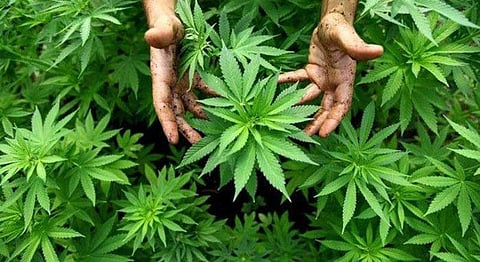
- HOMEGROWN WORLD
- #HGCREATORS
- #HGEXPLORE
- #HGVOICES
- #HGSHOP
- CAREERS
- ABOUT US
- CONTACT US

Former International Diplomat, and currently a second-term Lok Sabha MP, Shashi Tharoor on 5th June wrote “High Time India, Land of Bhang, legalises marijuana”. Drafting it alongside him was his nephew Avinash Tharoor who works on Drug-related policy issues.
Arguments in favour of Legalisation (or decriminalisation) find their voice in the recreational smoker community more often than from those who do not use the drug at all. But change in times must be acknowledged when an able politician, considered a shining glimmer of hope in the Indian Political spectrum by many, pens his opinion urging authorities to make amends for the past. The article borders on the notion that letting people decide for themselves about the impact of marijuana use, is better than a comprehensive and systematic regulation given the country’s current socio-political scenario. Against the argument is a majority impending the need of a formal sit-down.
But before we dive into the extremities of the argument, let’s take apart the important pointers in the article written by Mr. Tharoor and Mr. Tharoor, starting with the fact that Mr. Shashi himself does not smoke or consume marijuana in any shape or form.
Mr. Tharoor observes, “the prohibition of Marijuana legally began with The Prohibition of Cannabis was instated in late 20th century. However, the drug had already been illegal in the country for over two decades because our government had signed the UN’s Single Convention on Narcotic Drugs treaty in 1961.” In the UN Single Conventions’ observation, Marijuana was named ‘A serious evil’, and Tharoor can be given nodded agreements to call out such allegations as “hyperbolic” in nature.
While there are proven instances of economic boom of Marijuana industry in the states, supported by instances of CBD oil healing seizures, anxiety, and in some instances, even Cancer, it is Mr. Tharoor’s ingenuity to observe the cogs of the marijuana situation in detail prevailing in the country. We are reminded that “the potential risks that cannabis pose illustrate why it is our duty to legally regulate this drug”.
In India, consumption of Marijuana comes with navigating past hurdles fit for a televised reality game show. Because of the drug’s illegal nature, Tharoor observes “cannabis sales currently line the pockets of various characters in a vast criminal underworld, some of whom may be committing far more nefarious crimes”. This in turn reduces the stress of procuring the drug on the consumers, wherein Paranoia is not the only side-effect. The article observes that the trade currently is in the hands of criminals. “The drug should be safely produced by competent farmers, packaged and tested in suitable facilities, and sold by reputable and licensed vendors”. We must recognize criminals in the economic activities which follow the cultivation of the crop.
Tharoor pays great attention to Regulation. While the debating parties here may tear at each other over the repercussions of a potential “drug-addled society”, it fails to acknowledge the already dependent nature of non-technically abled labour consumed by alcoholism, the sale of cancer-sticks, chewing tobacco and the overall depreciation of mental health in the country’s work-force, majority of whom earn less than $4 per day and spend money they can’t afford to on cheap and often fatal alcohol. Representation for Marijuana by the eccentric Mr. Tharoor must come as a welcome respite for the voices of recreational marijuana users who more often than not, would prefer not indulging in any debate over the drug.
Dharamvir Gandhi, a Member of Parliament from Patiala, is seeking to legalise marijuana possession and consumption in India among other “non-synthetic” intoxicants. There are many other politicians and individuals who have started using hemp bio-fibre to highlight the many uses of the parent plant too.
Read the article by Shashi Tharoor in ‘The Print’ here.
If you liked this article, we suggest you read:
